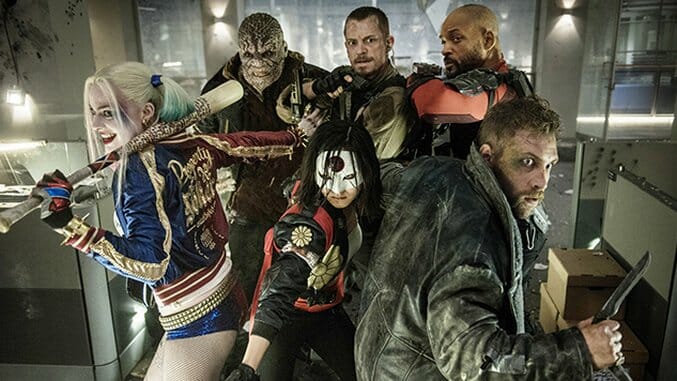Suicide Squad

For all of the recurring issues of the modern superhero film—weightlessness, lack of context, poor pacing, narrative overload—there’s one thing that most of them get right: an understanding of the relationship between the superhero and the world-at-large. That relationship may not always be satisfying or well-defined, but at the very least, each film is imbued with an inherent sense for how a hero or villain differs from the average human being. Adapted from the long-running DC comic series, David Ayer’s Suicide Squad is at a fundamental disadvantage in this respect.
The characters in Suicide Squad are the dissidents, the psychopaths, the anti-social powder kegs who are just waiting for the right opportunity to slaughter the innocent and breed unrest. They’re also far more interesting than the usual crop of tortured heroes who crowd multiplexes every year. But as purely entertaining as it is watching fan-favorites like Harley Quinn (Margot Robbie) chip away at monsters with baseball bats, Ayer’s film is so beholden to the DC machine and Zack Snyder’s Sucker Punch aesthetic that it’s hard not to see the entire thing as much more than a dry run for an inevitable franchise than as its own satisfying experience.
The premise for Suicide Squad is as simple as it is indelible, a re-brand of The Dirty Dozen filled out with an undercard of DC’s most naturally colorful villains and anti-heroes. Ayer slips into this framework with ease, introducing Amanda Waller (Viola Davis) describing her potential team of supers to an incredulous group of government suits. Flipping through her dossiers, Ayer offers a slick montage of each candidate’s greatest hits, and minutes later, Waller is in front of the criminals laying out a deal of commuted sentences for off-the-books operations, handing them their weapons of choice.
Among the chosen rogues’ gallery are Deadshot (Will Smith), a stylish hitman with a heart of gold for his 11-year-old honor student daughter; Boomerang (a never better Jai Courtney), a keyed-up dirtbag bank robber; El Diablo (Jay Hernandez), a former Los Angeles gang member who lights up when angry; Killer Croc (Adewale Akinnuoye-Agbaje), a scaly super villain with a nasty temper; and Enchantress (Cara Delevingne), an archaeologist who accidentally fused with a demonic supernatural presence—and now has the ability to toggle between her human self and a shadowy wraith who possesses magical powers.
In the time leading up to the release of Suicide Squad, the plot has been shrouded in mystery, and while I wish I could say that’s because it’s a complex narrative that’s worth hiding, it’s more that the film’s story is full of half-measures. There’s not much that can be said: The group is faced with a supernatural presence, simultaneously contending with the Joker (Jared Leto), whose screen-time has been seriously overestimated.
Falling into same the pratfalls of Ayer’s previous effort, Fury, Suicide Squad is another case where story elements are continuously piled on in the hopes that a coherent narrative arc will emerge. Individual moments land with nearly every character, especially Deadshot and Harley Quinn, but despite being a firmly character-based film, it lacks a through line. In action scenes, Ayer is exceedingly generous, allowing each character a turn in the limelight, but the film is constantly muddling its own sense of purpose, making plot decisions that feel improvisatory by its end.
Part of the problem is that the audience is rarely ever aware how powerful the members of the Suicide Squad are in relation to each other or to their adversaries. Sometimes they’re killing machines who don’t bat an eye when swarmed by enemies, and other times they’re out of their depth. That becomes emotionally distancing as the film starts to build up a Big Bad who’s coming from a purely supernatural point of view.
-

-

-

-

-

-

-

-

-

-

-

-

-

-

-

-

-

-

-

-

-

-

-

-

-

-

-

-

-

-

-

-

-

-

-

-

-

-

-

-








































